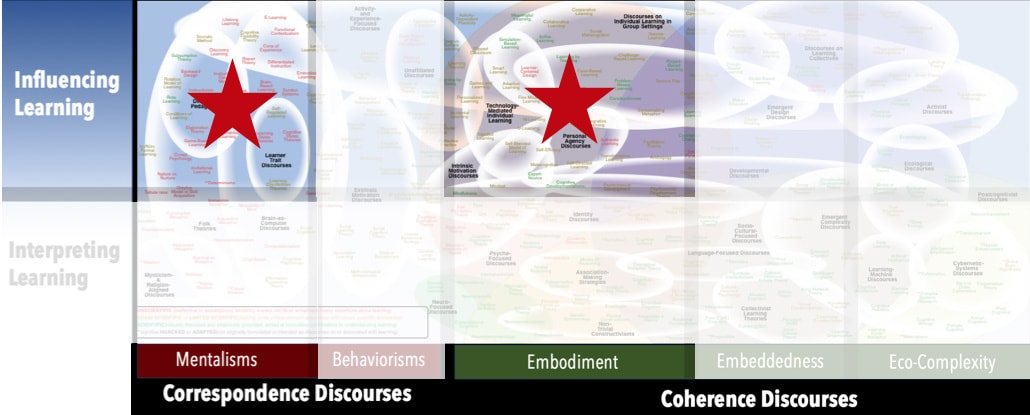Focus
Understanding and manipulating learning environments to channel learner developmentPrincipal Metaphors
- Knowledge is … a territory/area/domain/field (typically involving challenge)
- Knowing is … attaining a goal
- Learner is … agent on a trajectory (in a social setting)
- Learning is … development
- Teaching is … promoter (of action)
Originated
1990sSynopsis
Zone Theory of Child Development claims to build on Socio-Cultural Theory – specifically the notion of zone of proximal development (ZPD), which is based on the realization that a learner in the presence of an expert is often able to do more than a learner working unaided. One’s ZPD encompasses those developmental possibilities that are within reach, with guidance. Zone Theory of Child Development adds two additional zones:- Zone of Free Movement (ZFM) – signals what the learning environment allows, and it encompasses environmental conditions that enable or constrain actions and access
- Zone of Promoted Action (ZPA) – signals what the teacher promotes, and it encompasses teacher-intended actions and interactions to encourage specific types of learning.
Commentary
Zone Theory of Child Development follows a minor trend in education to name “zones” that ostensibly define possibilities for learning and personal development. Other examples (listed chronologically by publication dates) include:- Circle of Influence / Circle of Concern (Stephen Covey, 1980s) – a model comprising one circle nested in another, intended to afford insight into where one should focus one’s energy for maximum effectiveness:
- Circle of Concern (Stephen Covey, 1980s) – the outer circle, which includes everything one cares about but cannot directly control (e.g., others’ actions, politics, climate change). Worrying about such matters drains energy. Proposed subcategories include:
- Circle of Adapt (Circle of Acceptance) (unknown origin) – a region that is sometimes placed within the Circle of Concern (and around the Circle of Influence; see below) representing things one cannot control but can choose to adapt to or accept (e.g., others’ behavior or external circumstances). The category encourages resilience and flexibility in response to what one cannot change.
- Circle of Escape – a region that is sometimes inserted within the Circle of Concern (and around the Circle of Influence),representing factors one cannot control or influence, but that can be avoided or evaded by moving to a different context
- Circle of Influence (Stephen Covey, 1980s) – the inner circle. which contains what one can directly impact (e.g., one’s beliefs, relationships, and behaviors). Focusing on this circle increases one’s influence over time. Proposed subcategories include:
- Circle of Control (unknown origin) – a region that is sometimes nested within the Circle of Influence, signifying everything over which one has complete control (e.g., one’s thoughts, choices, and reactions). The category highlights one’s most direct areas of influence, emphasizing personal responsibility.
- Circle of Concern (Stephen Covey, 1980s) – the outer circle, which includes everything one cares about but cannot directly control (e.g., others’ actions, politics, climate change). Worrying about such matters drains energy. Proposed subcategories include:
- Learning Zone Model (Tom Senninger, 1990s) – a three-tiered model, often presented as nested regions, that locates the optimal place for learning (the Learning Zone) between a low-risk Comfort Zone and a high-risk Fear Zone:
- Comfort Zone – the space of the familiar, associated with routine, safety, low risk, freedom from judgment, relaxation, and rejuvenation – but also limited reward
- Learning Zone (Growth Zone) – the space of productive novelty, associated with curiosity, manageable problems/challenges, experimentation, new skills, and deeper insights
- Fear Zone (Panic Zone) – the space of debilitating novelty, associated with likely failure, trauma, stress, and emotional overload
- Affect-Related Performance Zones (IAPZs) (Michael B. Johnson, 2000s) – the ranges of emotions (e.g., arousal, enjoyment) within which one is likely to perform at optimal, moderate, or poor levels. Associated constructs include:
- Zone of Optimal Functioning (ZOF; Zone of Individual Optimal Functioning, ZIOF) – the range of physiological arousal associated with peak attentiveness, learning, and performance
- Zone of Potentiality (ZOP) – the range of one’s possible learning in relation to a specific competence or discipline
Authors and/or Prominent Influences
Jean ValsinerStatus as a Theory of Learning
Zone Theory of Child Development is not a theory of learning.Status as a Theory of Teaching
Zone Theory of Child Development represents an attempt to translate Socio-Cultural Theory into a model that informs teaching, by combining two “zones” over which educators can have direct control to a zone over which they can have only indirect influence.Status as a Scientific Theory
Because of the manner in which it uncritically blends Folk Theories with Socio-Cultural Theory, Zone Theory of Child Development does not meet our criteria for a scientific theory. The perspective is associated with some empirical evidence – but, arguably, that evidence is better interpreted using Socio-Cultural Theory alone.Subdiscourses:
- Affect-Related Performance Zones
- Circle of Adapt (Circle of Acceptance)
- Circle of Concern
- Circle of Control
- Circle of Escape
- Circle of Influence
- Comfort Zone
- Fear Zone (Panic Zone)
- Learning Zone (Growth Zone)
- Learning Zone Model
- Zone of Free Movement (ZFM)
- Zone of Optimal Functioning (ZOF; Zone of Individual Optimal Functioning, ZIOF)
- Zone of Potentiality (ZOP)
- Zone of Promoted Action (ZPA)
Map Location

Please cite this article as:
Davis, B., & Francis, K. (2025). “Zone Theory of Child Development” in Discourses on Learning in Education. https://learningdiscourses.com.
⇦ Back to Map
⇦ Back to List
